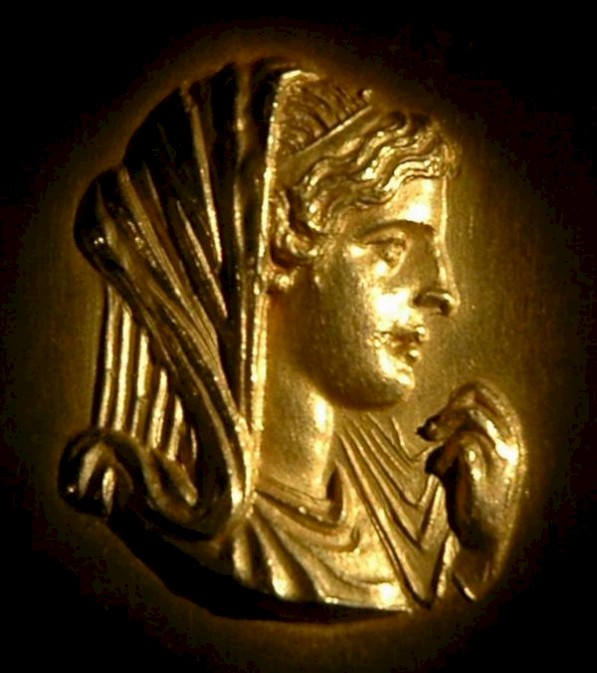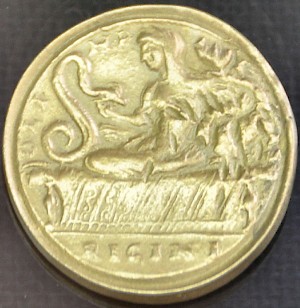Olympias
Olympias (c.375-316): Epirote princess, married to the Macedonian king Philip II, and mother of Alexander the Great.

The girl who was later to be called Olympias was the daughter of Neoptolemus, the king of the Molossians, one of the greatest tribes in Epirus. They lived in the neighborhood of modern Ioannina in Greece. During Neoptolemus' reign, the tribe became more sedentary; urbanization started and we hear about scribes and other administrative officials. In 358, the Molossians became the allies of the Macedonian king Philip II (360-336); the alliance was strengthened by a diplomatic marriage. In 357, Olympias became Philip's wife.
Next year, a chariot that Philip had sent to the Olympic games, was victorious. Therefore, the queen received the name Olympias. In the same summer, she gave birth to her first child: Alexander. According to the Greek author Plutarch of Chaeronea (46-c.122), these events took place on the same day (text).
In Antiquity, people believed that the birth of a great man was accompanied by portents. They are mentioned by Plutarch:
The night before the consummation of their marriage, Olympias dreamed that a thunderbolt fell upon her body, which kindled a great fire, whose divided flames dispersed themselves all about, and then were extinguished. And Philip, some time after he was married, dreamt that he sealed up his wife's body with a seal, whose impression, as be fancied, was the figure of a lion.note

Philip and Olympias also had a daughter Cleopatra, who was to play an important role in the years after the death of Alexander. The birth of the crown prince and a princess that could be used in international affairs must have enhanced Olympias' position, but political influence cannot be proven. It is true, Philip appointed Olympias' brother Alexander (not to be confused with her more famous son) as king of Molossis (350), but this does not mean that Olympias was behind the arrangement. After all, the Molossian throne was rightfully Alexander's.
In August 338, Philip defeated the Greeks; next year, he reorganized the conquered territories in the Corinthian League. At the same time, he married to a woman named Cleopatra, a relative of a Macedonian aristocrat named Attalus. This caused great tensions between the king, Olympias and the crown prince.
Olympias went into voluntary exile, staying at the Molossian court of her brother Alexander. Her son Alexander and his friends (e.g., Ptolemy and Nearchus) were briefly expelled, but returned soon after. Olympias was further isolated when Philip married Olympias' own daughter Cleopatra to Alexander of Molossis (336): she could no longer count on her brother's support.
However, Philip was killed during the wedding in October 336. Many suspected Olympias and her son Alexander. The fact that (after her return to Macedonia) she ordered Philip's wife Cleopatra and her child to be murdered, did not improve her reputation. However, her son was now king, and her position was safe.

During Alexander's campaigns, she kept in touch with him. Our sources mention their correspondence. She probably confirmed the claim, made by her son during his visit to Egypt, that Alexander was the son not of Philip, but of the god Zeus Ammon. It is even possible that she made this claim before Philip's death (and, consequently, before Alexander's visit to Siwa): the events of 337-336 offered ample opportunity.
Although the relations with Alexander were cordial, he kept her far away from politics. Macedonia was ruled by Antipater, one of Philip's most reliable commanders and diplomats and the man who had helped Alexander become king. It seems that he and Olympias were not on speaking terms, and the queen-mother must have been glad that she could go back to Molossis in 330: her brother had died during a campaign in southern Italy, and she served as regent for her cousin Aeacidas.
On 11 June 323, Alexander died in Babylon, and the age of the successors or Diadochi began. His wife Roxane was pregnant of a son, who was born a few months later and was called Alexander. He and Alexander's brother Philip Arridaeus, who was mentally unfit to rule, were subject to the regency of Perdiccas, Alexander's vizier. He tried to strengthen his position by a marriage with Antipater's daughter Nicaea. However, Olympias offered him the hand of her daughter Cleopatra, a full sister of Alexander the Great (and the former wife of Alexander of Molossis). Perdiccas accepted this marriage, Antipater felt insulted, and the result was a civil war in which Antipater was victorious. He was the new regent of the royal family. However, he died almost immediately (319).
His successor as regent was an old general named Polyperchon. However, Antipater's son Cassander, who had taken Philip Arridaeus captive, forced him out of Macedonia. Polyperchon had to flee to Epirus, taking Roxane and the baby Alexander with him. Until then, Olympias had refused to support any side in the conflict, but now she realized that if Cassander were to rule, her grandson would definitely loose the crown. So she took the army of Aeacidas, joined the remains of Polyperchon's army and invaded Macedonia (317).
At the border, she captured Philip Arridaeus, who was executed immediately (October). Many supporters of Cassander were massacred as well. However, Cassander was approaching and besieged Olympias in Pydna, a harbor town at the foot of the holy mountain Olympus. Although both Polyperchon and Aeacidas tried to relieve her, she was forced to surrender. Cassander promised to save her life, but had her executed (316). Roxane and the baby Alexander were killed in secret.
The succession of Philip and the last two years of Olympias' life were full of bloodshed, and many authors - both ancient and modern - have considered her a cruel woman. This is exaggerated. She was trying to stay alive and see to the succession of her son and grandson. Of the many Macedonian leaders who took part in the civil wars after the death of Alexander the Great, she was one of the few who were not fighting for their own power, but for the legitimate dynasty.